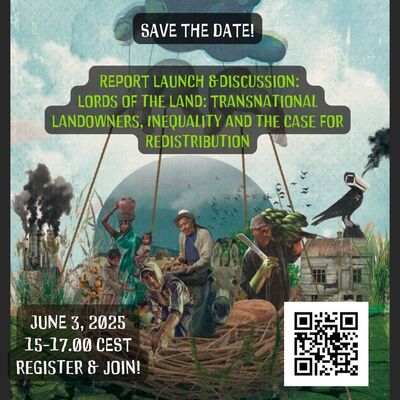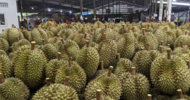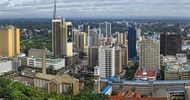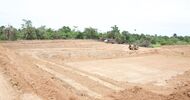Arizona’s attorney general has called for an investigation into a 2015 deal between the Saudi agribusiness company Fondomonte and the Arizona State Land Department for desert farmland west of Phoenix at one-sixth its market value.
- HighCountryNews
-
01 January 2023
Between 2017 and 2021, Mennonite colonies deforested about 4,000 hectares (10,000 acres) of Peruvian forests and encroached into the Native land of the Indigenous communities of Buenos Aires and Caimito.
- Mongabay
-
08 December 2022
Fresh controversy has emerged over the leading certification scheme for sustainable palm oil after a verification mission exposed ongoing issues around certified oil palm plantations in Cameroon.
- Mongabay
-
09 September 2022
An analysis of land conflicts involving palm oil companies in Indonesia, the world’s biggest producer of the commodity, shows the country lacks effective mechanisms for addressing these problems.
- Eco-business
-
02 December 2021
The recent arrests of staff of a Ugandan civil society organization, the Africa Institute for Energy Governance (AFIEGO), have been criticized as an attempt to stifle defenders of human rights and the environment in the country. AFIEGO is one of several organizations involved in defending the Bugoma Forest, which Hoima Sugar Ltd. is seeking to clear large portions of it for a sugarcane plantation.
In July 2021, a French court ruled against a group of Indigenous Bunong farmers from Mondulkiri in Northeastern Cambodia. In light of recent discussions on the potential and constraints of legal activism, we aim here to highlight entrenched structural factors that can hinder communities in legal challenges to corporate land grabs.
- Political Ecology Network
-
11 August 2021
Local government in Indonesia’s West Papua province has revoked permits for 12 oil palm concessions that cover an area twice the size of Los Angeles after a recent audit of palm oil concession holders found widespread administrative and legal violations. Activists have called on the government to follow up on the revocation by granting Indigenous peoples access to the rescinded concessions instead of granting new licenses to other investors.
FIDH, along with Global Witness and Climate Counsel, submitted an open letter dated March 16 to Fatou Bensouda, the current prosecutor at the International Criminal Court (ICC), urging to open a preliminary examination into land-grabbing in Cambodia.
A new report from the Oakland Institute, reveals that several well-known pension funds, trusts and endowments are invested in a group of oil palm plantations in the Democratic Republic of Congo accused of environmental and human rights abuses.
Two sugarcane companies have begun clearing thousands of hectares in disputed sections of Uganda’s Bugoma Forest. The National Forestry Authority (NFA) is challenging land titles granted to Hoima Sugar Limited and MZ Agencies, but a series of court defeats has forced the authority to remove its guards.
- Mongabay
-
05 November 2020
Latest research conducted by the Public Trust Media Group on SOCFIN rubber plantations (SRC and LAC) has documented gross human rights violations.
- Public Trust
-
05 October 2020
This investment marks the US pension’s first investment in farmland, and in its first in Homestead.
Israeli and Dutch firms, backed by the Dutch export credit agency, have signed a €108mn deal to construct four agriculture production and training centres across Côte d’Ivoire.
The scheme is devised by Green 2000, an Israel-headquartered company that specialises in agriculture projects. It involves the construction of four agriculture services and training centres, which provide land, facilities and machinery for producing fruit, vegetables, fish and other products.
- GTE Review
-
04 September 2020
People's Coalition on Food Sovereignty, GRAIN, and Ponlok Khmer urged the government of Cambodia to return disputed land from Chinese company Hengfu Group Sugar Industry to the Khmer and Indigenous Kuy communities. The groups expressed solidarity with the Indigenous Kuy people who continue to assert their legitimate land rights even amid the global health crisis.
A court in Indonesia has sentenced two indigenous farmers to eight and 10 months in prison for harvesting palm fruit from land whose ownership is contested by the community and a palm oil firm, PT Hamparan Masawit Bangun Persada. The ruling appeared to ignore evidence showing that the villagers are the rightful owners of the land
PT Hamparan Masawit Bangun, an affiliate to one of palm oil trader Wilmar International suppliers, has been operating illegally on community lands in Central Kalimantan, Indonesia. Now the company accused three indigenous farmers of stealing palm fruit from the land, an emblematic case of how corporations can weaponize law enforcement against communities over land disputes.
China grow more soybeans in Russia to replace imported American soybeans. More than 70 companies from Heilongjiang province already grow soybeans in Russia and there are eight foreign agricultural "industry parks" covering an area of 600,000 ha. The main threat of the soybean ventures appears to be incursions of Russian territory as China effectively colonizes its distant, empty Far East.
- Dimsums Blogspot
-
15 Mar 2020
Industrial-scale agriculture poses considerable risk to the indigenous peoples of Papua. Anthropologist Sophie Chao has studied the often fraught relationship between Papuans and plantation firms, and the mechanisms through which indigenous people are compelled to give up their land.
GRAIN recently learned that several cases of land grabbing have been prosecuted in the courts, or been acted upon by national authorities, and so we have compiled a short update on these developments.
These trends challenge rural communities and advocates of the people’s right to land and resources, food sovereignty and genuine land reform, to remain unwavering in their efforts to build a strong mass movement.
The ripples from the firing of Matt Lauer as the co-host of the “Today” morning news show have hit the world of New Zealand property, where officials are already scrutinizing the role of foreign buyers in an increasingly expensive market.
- NY Times
-
05 December 2017
Brazilian president Michel Temer has now twice survived votes to initiate impeachment against him. Temer did so by selling out the environment, allowing agribusiness to rent indigenous lands.
- Mongabay
-
06 November 2017
The investigative series Indonesia for Sale, shines new light on the corruption behind Indonesia’s deforestation and land rights crisis. The stories expose the role of collusion between palm oil firms and politicians.
Brazilian President Michel Temer has approved a recommendation that federal government bodies should adopt new criteria for setting the boundaries of indigenous land. The new measure will resulting ultimately in the dismissal of 90 percent of ongoing indigenous territory land claims.
- Intercontinentalcry
-
03 August 2017
Indonesia central government has recognized the rights of nine indigenous communities to the forests. That movement still has long way to go, the nine “customary forests” encompass a total of 13,100 hectares. By comparison, Indonesia’s nine biggest oil palm firms in 2013 had planted nearly 2 million hectares.
From late April to late May several public events were attended by between 1,000 and 2,000 people across the country
Capt. Hosa Okunbo and his technical and financial partners from the San Carlos Group in Mexico say that the farm has already taken off with an initial $11 million investment on a 20-hectare green house vegetables farm.
- http://thenationonlineng.net/edo-investor-okunbo-unveils-750m-farm/
-
17 Mar 2016
A ten-part video series, called Territories of Life, tells the stories of indigenous groups who have challenged development on their land. It covers a range of issues, from the tactics developers use to acquire land to case studies of successful resistance.
- Mongabay
-
23 February 2016
A New York company managing the retirement savings of workers in Sweden, the US and Canada is evading Brazilian laws on foreign investment to acquire farmlands from a businessman accused of violently displacing local communities.
Investment in agricultural production and trade often harms the rights of local and indigenous peoples while failing to contribute significantly to economic development, according to a new report from the Rights and Resources Institute.
















